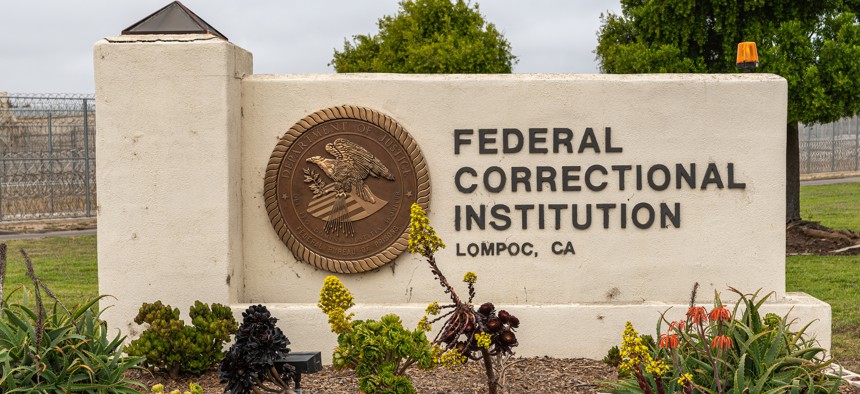Bureau of Prisons would issue IDs to released inmates under new bill

A sign near the entrance to the federal prison in Lompoc, Calif. A group of lawmakers want federal prisons to make sure released inmates have government issued identity cards. ClaudineVM/Getty Images
The bipartisan proposal would also require BOP to set up a system where ID cards issued by the bureau could be traded for state IDs.
A group of lawmakers behind a new, bipartisan proposal in the House of Representatives want to make sure that those leaving federal prisons take a valid government ID with them.
The Bureau of Prisons Release Card ID Act of 2024, introduced Thursday, would direct the Bureau of Prisons to issue id documents to all inmates who are U.S. citizens when they leave the BOP facilities.
BOP is already required by law to help incarcerated people get identity documents like Social Security cards, birth certificates and state-issued photo IDs before their release. Accomplishing this can be difficult because of the fees for identity documents, barriers to allowing prisoners to visit state departments of motor vehicles and more, according to a 2022 Government Accountability Office report.
BOP told Nextgov/FCW that the agency has already created a "release identification card" it deployed in all its institutions last fall for those without valid state IDs. It's issued over 2,000 so far and is "continuing efforts to establish agreements with states, territories, and government agencies to recognize and accept the release identification cards for state identification and government assistance"
For anyone who leaves federal custody without a valid ID, it can be difficult to get housing, social services or a job.
The lawmakers behind the new proposal say that legislation is needed to make sure that any card BOP comes up with meets requirements for accessing federal benefits and is able to be exchanged for an equivalent state ID.
“The BOP ID Act is a commonsense solution to a problem that’s preventing returning citizens from successfully reentering society. If we truly want to lower our nation’s recidivism rate, we need to start giving folks the proper tools needed to find a job, housing, and health care,” said Rep. David Trone, D-Md. — who sponsored the bill — in a statement. Trone also is a co-founder and co-chair of the Second Chance Task Force, focusing on reducing recidivism rates.
“Having spoken to BOP Director Colette Peters about this very issue, I know that by solving the government ID barrier to reentry, we will open doors for thousands of individuals to start over and rebuild their lives,” said Trone.
Reps. Barry Moore, R-Ala., Madeleine Dean D-Pa., and Nathaniel Moran, R-Texas, are also cosponsoring the bill, along with 12 other lawmakers.
If passed, the required ID given to citizens exiting BOP facilities would have to be valid for at least 18 months, satisfy requirements for the REAL ID Act and be usable for identity verification for federal programs like nutrition assistance.
The bill also tasks the BOP director with setting up a system with states where these BOP-issued IDs can be used to get state IDs, and the Department of Justice would also be directed to create guidance to states on issuing IDs for people released from state prisons.
Twenty-one states have laws meant to help people leaving prisons get IDs on their way out or immediately after release, although the specifics of these laws differ, according to the National Conference of State Legislatures.
“We need to give Americans being released from prison some basic tools to become functioning members of society, and a form of identification is a key item,” said Moore in a statement. “Without identification, it is almost impossible to get a job or find housing.”
Editor's note: This article has been updated to include a statement from BOP.



